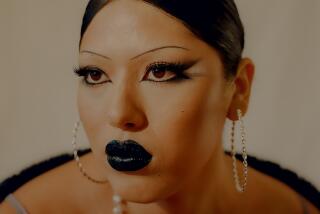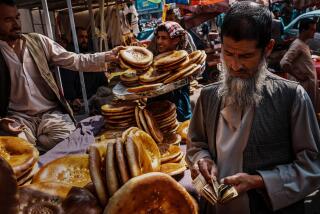The Beauty Shop Beckons in Post-Taliban Kabul
- Share via
KABUL, Afghanistan — If beauty is in the eye of the beholder, Humaira Momand’s customers aren’t much to look at.
The first brave patrons of the only working beautician in this ravaged Afghan capital depart her salon shrouded in the head-to-toe burka that obscures their stylish new haircuts, hennaed highlights and facial make-overs from any appreciative glances.
But both Momand and her customers insist that the day is soon coming when they can shed the awkward veils that reduce women to indistinguishable bundles about as attractive as powder-blue bowling pins.
Feeling pretty was among the many sins condemned by the Taliban, and now that the fundamentalists have been driven out of Afghanistan, women have slowly and tentatively begun seeking professional help in rediscovering their beauty.
“I want to look nice for the weekend. It’s Eid and a month since the Taliban fell, and both of those occasions deserve celebrating,” says Azima, a 28-year-old who had her raven hair trimmed and highlighted ahead of the festivities that are to begin this weekend, whenever the new moon signals the end of Ramadan. Like many Afghans, she goes by one name.
The Muslim holy month was an unfortunate time for Momand to try to revive the business begun 40 years ago by a family friend, as daily routines have been disrupted by fasting. What’s more, most households remain nervous as Afghans await a transfer of power from warlords to an interim government. So there is neither time nor money for most women to indulge in something as frivolous as improvement of their appearance.
Women’s needs remain an irrelevance in this country, where until four weeks ago they were forbidden to attend school, speak in public or leave their homes without the permission and escort of a male relative.
“We couldn’t even talk loudly or laugh within our own homes, and we were forbidden to go close enough to the windows to be seen from outside,” recalls Rahima, a 28-year-old mother of seven who scrabbled together enough money to have Momand pluck her eyebrows and apply a little makeup.
It’s easy to see why the Taliban forbade such businesses to remain open. Behind the curtain separating the one-room, concrete-floored salon from the bustling, traffic-clogged road outside, the women plot and gossip freely, shedding the hated burkas as soon as they walk in.
“It’s terrible,” Rahima says of the coverings. “You can’t see where you’re going, and it’s always getting caught in your shoes. I stepped on the hem the other day and fell into the gutter.”
Rahima matured during the 10-year Soviet occupation and was able to go to school through the eighth grade before her traditional parents married her off at age 14. Still, she was never forced to wear a burka until the Taliban seized power in 1996 and began beating women who dared go out in public without it.
“In the Soviet era, we didn’t have to wear any veils at all. We had more rights then, even if our country was occupied. Then the moujahedeen came, and we had to cover our heads with the chador. But only for the past five years have we been in these,” she says, clutching the sky-blue burka that had been rolled up on the bench beside her.
Waiting for Other Women to Set the Pace
Azima, an unemployed teacher married to an engineer for the grounded Afghan airline, Ariana, also longs to walk about freely, showing her face to a world from which she was excluded for half a decade.
“When other women leave the burka, so will we,” she says, explaining that a melding of tradition, respect for elders and a lingering fear of the Taliban militia dissuade even the most self-assured women from moving too fast toward a freer future.
Momand concedes that she too worries about the extent of the emancipation that appears to have followed the Taliban’s retreat. But she reopened the shuttered salon four days after the fundamentalists withdrew under bombardment by U.S. air power and Northern Alliance fighters who have since taken control of Kabul.
“It’s Ramadan, and not so many people know we are here yet,” she says of the beauty parlor, adorned with posters of big-haired Indian movie stars and cans of German hair spray.
A mother of five young children, Momand must close her salon at 2 p.m. each day to be home in time to prepare the evening meal--a chore that without fail falls to Afghan women, even those whose husbands, like Momand’s, earn less and work fewer hours.
If she could stay open in the evenings, she would make more money, she explains. Electrical power is cut to all of Kabul from 10 a.m. to 5 p.m., meaning the single dome-style hair dryer and motley array of curling irons and fans are useless during the workday. On the other hand, she notes, few women are likely to venture out after dark for her services.
Her first month in business has been less than lucrative, she concedes, noting that she hasn’t even cleared the 1 million afghanis, or about $30, she needs to pay the landlord for the salon’s monthly rent. But she also holds out hope that during the three-day Eid al-Fitr celebrations, and amid rising hopes for Afghanistan’s future, patronage will grow.
“The Women’s Assn. is starting to take names for new beauty school classes,” says 27-year-old Pekai, Momand’s apprentice. “In time, there will be lots of salons in competition with ours, and hopefully many customers, so we can all be successful.”
More to Read
Sign up for Essential California
The most important California stories and recommendations in your inbox every morning.
You may occasionally receive promotional content from the Los Angeles Times.














